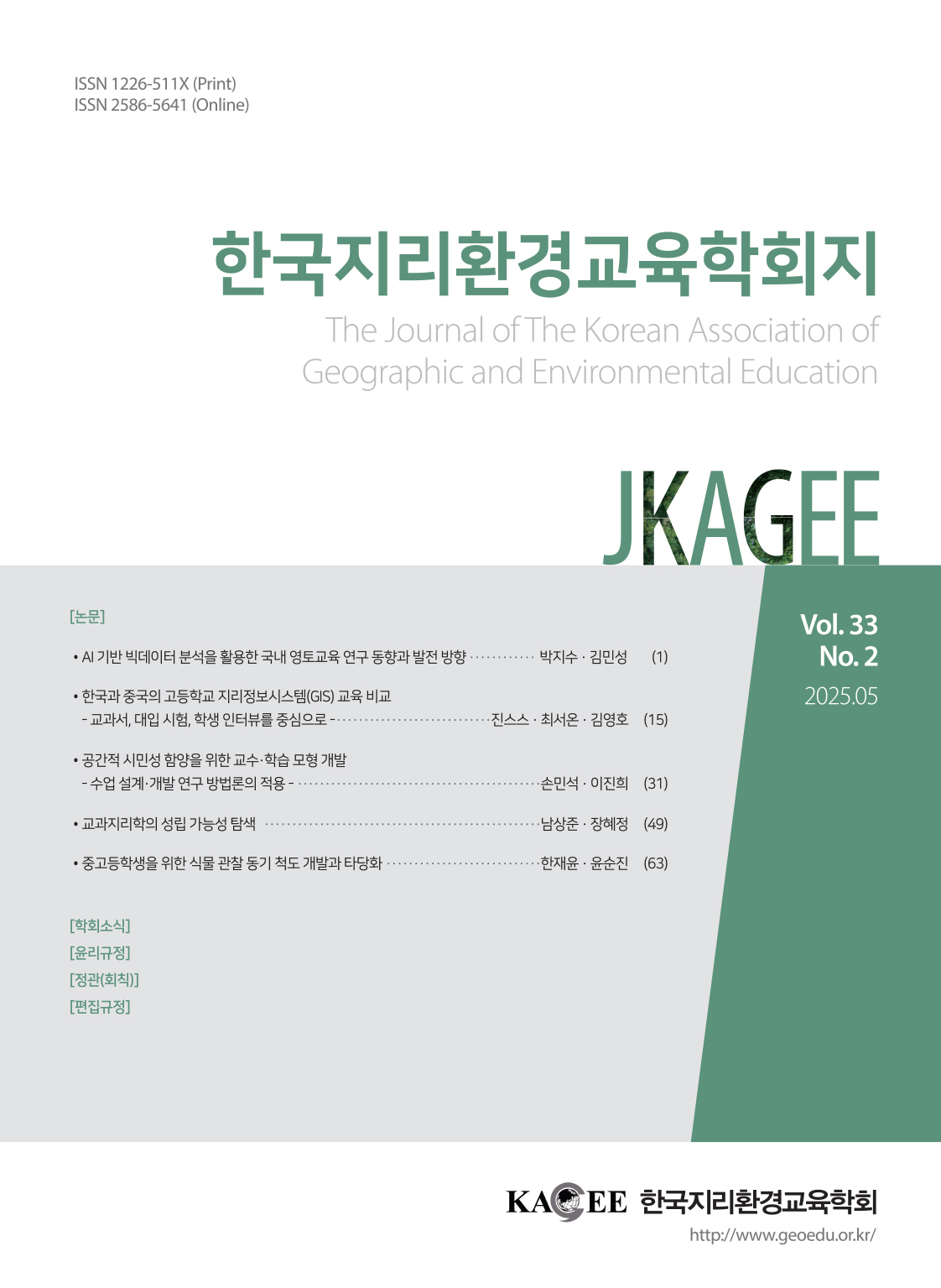Research Article
Abstract
References
Information
The purpose of this study is to compare and verify the learning effect of a simulation game activity in a geography class. To clarify the learning effect of a simulation game activity, three activities on the theme of urban flood, namely, workbook solving activity, card matching game activity, and flood simulation game activity designed. In addition, each activity was examined in terms of ‘perceived reality’, ‘knowledge acquisition and understanding of principles’, and ‘interest’. As a result of the study, while there was no significant difference between class activities in ‘perceived reality’, there was a higher learning effect in workbook solving activity in ‘knowledge acquisition’. On the other hand, in the ‘understanding of principles’ section, simulation game activity and workbook solving activity showed almost the same learning effect, and ‘interest’ showed that both game activities were higher.
본 연구의 목적은 지리 수업에서 시뮬레이션 게임 활동의 학습 효과를 비교·검증하는 것에 있다. 이를 위해, 도시홍수를 주제로 한 세 가지 활동, 즉 학습지 풀이 활동, 카드 맞추기 게임 활동, 홍수 시뮬레이션 게임 활동을 설계하였으며, 각 활동별로 ‘인식된 현실성’,‘지식 습득 및 원리 이해도’,‘흥미도’의 측면에서 살펴보았다. 연구 결과‘인식된 현실성’에서 수업 활동 간에 유의미한 차이가 나타나지 않았고‘지식 습득’에서는 학습지 풀이 활동이 더 높은 학습 효과를 보이는 것으로 나타났다. 반면‘원리 이해’부분에서는 시뮬레이션 게임 활동과 학습지 풀이 활동이 거의 같은 학습효과가 있는 것으로 나타났으며,‘흥미도’는 두 게임 활동이 더 높은 것으로 나타났다.
- 강영미, 2008, “게임을 활용한 지리과 교수-학습 모형의 적용과 효과”, 제주대학교 교육대학원 석사학위논문.
- 강정은‧이명진, 2012, “퍼지모형과 GIS 를 활용한 기후변화 홍수취약성 평가-서울시 사례를 중심으로”, 한국지리정보학회지, 15(3), 119-136.10.11108/kagis.2012.15.3.119
- 강태욱, 2017, “사회과 컴퓨터 시뮬레이션 게임 수업 모형 구성”, 대구교육대학교 교육대학원 석사논문.
- 구정화‧한진수‧정필운‧설규주‧장준현‧정석민‧박정애‧엄정훈‧허은경‧김동환‧김민수‧옹진환, 2015, 사회①, 천재교육.
- 길양숙, 1999, “중등학교 교사들이 사용하는 수업방법 및 교수행동의 분석”, 교육과정연구, 17(1), 301-331.
- 김광희, 1995, “리얼리티 프로그램이 청소년의 인식된 현실성에 미치는 영향에 관한 조사연구”, 이화여자대학교 석사학위논문.
- 김보경‧장대원‧장남‧양동민, 2011, “기후변화를 고려한 도시홍수 위험요인 도출”, 한국위기관리논집, 7(1), 125-142.
- 김수웅, 2005, “사회과 소비자교육을 위한 시뮬레이션 게임의 개발 및 적용”, 서울교육대학교 교육대학원 석사학위논문.
- 김영순‧박선미‧황규덕‧조수진‧김부헌‧신현각‧이은상‧김세배‧박찬정‧이금란‧김용걸‧김웅‧정지만‧이수연, 2015, 사회①, 동아출판.
- 김진수‧문대영‧조성호‧김숙‧문승규‧이강준‧최영아‧이희원‧손영찬‧오두환‧김신정‧이은주‧박진민‧양설‧이상급, 2015, 사회①, 미래엔.
- 김혜숙, 2018, 교실생태학과 지리 수업 연구. 한국지리환경교육학회 (엮음), 현대 지리교육학의 이해, 503-528, 푸른길.
- 노태희‧정은희‧강석진‧한재영, 2002, “개념 학습에서 변칙 사례의 역할”, 한국과학교육학회지, 22(3), 586-594.
- 모경환‧이윤호‧강대현‧김현경‧이수화‧황미영‧조철기‧승현아‧김영일‧서정현‧윤민주‧나유진, 2015, 사회①, 금성출판사.
- 박주용‧민경석, 2009, “구성적 선다형 검사에서 선다형과 단답형의 문항 특성 비교”, 교육평가연구, 22, 451-469.
- 박창열‧신상영, 2014, “도시홍수 피해 저감을 위한 불투수면 규제 효과 분석”, 서울도시연구, 15(1), 85-99.
- 박현경, 2012, “지리 수업에 활용 가능한 시뮬레이션 게임의 적용과 효과”, 이화여자대학교 교육대학원 석사학위논문.
- 박형준‧신정엽‧이봉민‧서현진‧김현철‧박서연‧이정식‧김봉수‧조영매‧이혜란‧고인석‧신정아‧김찬미, 2015, 사회①, 천재교과서.
- 백성혜‧류혜정, 2014, “서술형 평가에서의 교사평가와 동료평가 활동 경험에 따른 고등학생들의 인식”, 한국과학교육학회지, 34(6), 593-599.10.14697/jkase.2014.34.6.0593
- 백영균, 2010, 가상현실공간에서의 교수-학습, 학지사.
- 변영계, 2006, 학습이론의 이해, 4판, 학지사.
- 서재천, 1998, “사회과 시뮬레이션 학습에 관한 일 고찰”, 사회과교육, (31), 193-211.
- 서태열, 2005, 지리교육학의 이해, 한울아카데미.
- 손현정, 2011, “여성 수용자의 성범죄 보도 시청량과 현실인식 간 관계 분석”, 경희대학교 언론정보대학원 석사학위논문.
- 연수진, 2008, “초등사회과 금융소비자교육을 위한 시뮬레이션 판게임의 적용”, 부산교육대학교 교육대학원 석사학위논문.
- 우연경, 2012, “흥미 연구의 현재와 향후 연구 방향”, 교육심리연구, 26(4), 1179-1199.
- 이민부‧조영달‧김왕근‧김기남‧김도영‧김태환‧박세구‧박찬선‧박철용‧이병인, 2015, 사회①, 박영사.
- 이상호. 2007, “행정학 연구에서 사용된 내용분석법의 방법론 분석: 한국행정학보 게재 논문(1991-2005)의 사례”, 행정논총, 45(2), 1-23.
- 이자영, 2001, “사회과 경제학습에서 토의형 시뮬레이션 게임의 적용 효과”, 서울교육대학교 석사학위논문.
- 이지윤, 1991, “시뮬레이션 게임에 의한 지리과 학습의 연구”, 이화여자대학교 교육대학원 석사학위논문.
- 전봉식, 2001, “사회과에서의 문화 비교 시뮬레이션 게임이 타문화 이해에 미치는 영향”, 초등사회과교육, 13, 335-353.
- 조철기, 2015, 지리 교재 연구 및 교수법, 푸른길.
- 최성길‧최원회‧강창숙‧박상준‧최병천‧조일현‧권태덕‧이수영‧조철민‧조성백‧김상희‧강봉균‧정민정‧김연주, 2015, 사회①, 비상교육.
- 한동균, 2018, “글로벌 정의교육을 위한 공감의 사회과 지리수업 모델 개발 및 적용 방안 모색”, 한국지리환경교육학회지, 26(1), 37-58.
- Alessi, S. M., and Trollip, S. R., 2001, Multimedia for Learning: Methods and Development, Needham Height : Allyn & Bacon.
- Crookall, D., 2010, Serious games, debriefing, and simulation/ gaming as a discipline, Simulation & Gaming, 41(6), 898-920.10.1177/1046878110390784
- Dale, E, 1954, Audio-visual Methods in Teaching, New York : Dryden.
- Faria, A. J., and Whiteley, T. R., 1990, An empirical evaluation of the pedagogical value of playing a simulation game TN a principles of marketing course, Developments in Business Simulation and Experiential Learning, Proceedings of the Annual ABSEL conference, 17.
- Kapp, K. M., 2013, The Gamification of Learning and Instruction Fieldbook: Ideas into Practice, Wiley & Sons.
- Kim, M., and Shin, J., 2016, The pedagogical benefits of SimCity in urban geography education, Journal of Geography, 115(2), 39-50.10.1080/00221341.2015.1061585
- Kim, S., Song, K., Lockee, B., and Burton, J., 2018, Gamification in Learning and Education, Cham : Springer.10.1007/978-3-319-47283-6
- Kormi-Nouri, R., Nilsson, L.-G. and Ohta, N., 2005, The novelty effect: Support for the novelty‐encoding hypothesis, Scandinavian Journal of Psychology, 46(2), 133-143.10.1111/j.1467-9450.2005.00443.x15762941
- Mönter, L., and Otto, K. H., 2018, The concept of disasters in Geography Education, Journal of Geography in Higher Education, 42(2), 205-219.10.1080/03098265.2017.1339266
- Pease, M., Pérez-Lapeña, B., and Lant, C., 2019, Energy and water resource simulations for US geography undergraduates, Journal of Geography in Higher Education, 43(1), 40-55.10.1080/03098265.2018.1554629
- Plass, J. L., Homer, B. D., and Kinzer, C. K., 2015, Foundations of game-based learning, Educational Psychologist, 50(4), 258-283.10.1080/00461520.2015.1122533
- Potter, W. J., 1988, Perceived reality in television effects research, Journal of Broadcasting & Electronic Media, 32(1), 23-41.10.1080/08838158809386682
- Qian, M., and Clark, K. R., 2016, Game-based Learning and 21st century skills: A review of recent research, Computers in Human Behavior, 63, 50-58.10.1016/j.chb.2016.05.023
- Randel, J. M., Morris, B. A., Wetzel, C. D., and Whitehill, B. V., 1992, The effectiveness of games for educational purposes: A review of recent research, Simulation & Gaming, 23(3), 261-276.10.1177/1046878192233001
- Sitzmann, T., 2011, A meta‐analytic examination of the instructional effectiveness of computerbased simulation games, Personnel Psychology, 64(2), 489-528.10.1111/j.1744-6570.2011.01190.x
- Taillandier, F., and Adam, C., 2018, Games ready to use: A serious game for teaching natural risk management, Simulation & Gaming, 49(4), 441-470.10.1177/1046878118770217
- Telner, D., Bujas-Bobanovic, M., Chan, D., Chester, B., Marlow, B., Meuser, J., and Harvey, B., 2010, Game-based versus traditional case-based learning: comparing effectiveness in stroke continuing medical education, Canadian Family Physician, 56(9), e345-e351.
- Tsai, M. H., Chang, Y. L., Kao, C., and Kang, S. C., 2015, The effectiveness of a flood protection computer game for disaster education, Visualization in Engineering, 3(1), 9.10.1186/s40327-015-0021-7
- Walford, R., 2007, Using Games in School Geography, London : Chris Kington.
- Washbush, J., and Gosen, J., 2014, Total Enterprise simulation learning compared to traditional learning in the business policy course, Developments in Business Simulation and Experiential Learning, Proceedings of the Annual ABSEL conference, 29.
- 네어버 국어사전, https://ko.dict.naver.com(2020년 7월 14일 최종접속)
- 네이버 지식백과, https://terms.naver.com(2020년 7월 14일 최종접속)
- 물정보포털 MyWater, http://www.water.or.kr(2020년 7월14일 최종 접속)
- Publisher :The Korean Association Of Geographic And Environmental Education
- Publisher(Ko) :한국지리환경교육학회
- Journal Title :The Journal of The Korean Association of Geographic and Environmental Education
- Journal Title(Ko) :한국지리환경교육학회지
- Volume : 28
- No :3
- Pages :61-80
- DOI :https://doi.org/10.17279/jkagee.2020.28.3.61



 The Journal of The Korean Association of Geographic and Environmental Education
The Journal of The Korean Association of Geographic and Environmental Education







